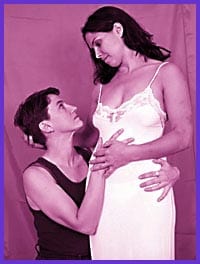For her 30th birthday a few years back, playwright Leanna Brodie gave herself The Vic. Freeing herself from her usual acting, translating and pay-the-bills-day-job routine for a few weeks, she shut off the phone and sat down and wrote her first play.
“The first draft was 170 pages,” Brodie laughs. “I really tried not to censor myself and get it all out. I guess I was successful. Of course, no one else but me has read that one.”
The second draft she showed to friends. Then a grant bought her another six weeks to clean it up. And it’s that version that caught the attention of David Oiye, then the artistic director of Cahoots Theatre. (Oiye is now the artistic director of Buddies In Bad Times.) After two workshops, The Vic will premiere this month in a Theatre Passe Muraille and Cahoots co-production.
The Vic examines the ways in which women are both the victims and the perpetrators of violence. A search for a missing girl brings together four separate story lines. In one, an ambitious young artist of colour is mentored by an older, racist woman. In the second, a lesbian couple from very different backgrounds struggle with their relationship. In the third, a young woman returns home to her mother and sister after escaping a cult; the family attempts to piece together what’s happened to her. And the final story is comprised of a teenaged girl’s video diary entries.
Brodie was inspired in part by the trial of Karla Homolka. “Paul Bernardo didn’t interest me,” Brodie says. “He was just some garden variety psycho. But people’s reactions to Karla Homolka and to the victims were so profoundly revelatory, in terms of how people viewed women when they are victims or when they are violent.”
Around the same time as the Homolka and Bernardo trials, Brodie was taking an acting course with RH Thompson, who brought in a scene from Glenngary Glen Ross one day to discuss. He suggested to the predominantly female class that no one would be interested in performing it since it was such a male play.
“Well, that was a dare,” says Brodie. She and actress Barbara Gordon took the scene home to rehearse. “When we actually looked at it, we thought: ‘God, what have we gotten ourselves into?’ It was brilliant, but such a guy thing. All the language was so macho. Every other word was ‘fuck’ or ‘fucking.’ We didn’t know how to play it.”
First they tried it in drag, but that was disastrous. Then Gordon suggested just doing it as two women. “That clicked. What we realized was that the language was all wrong, but the feelings were familiar – anger, envy, competitiveness.
“To do the scene, Barbara and I had to use muscles that we never get to use as actresses. And I thought, ‘How come women never get parts like this?’ I was conscious of that as I was writing and re-writing the play – that especially for women in their 30s, who are too old to be ingenues but too young to be mothers-in-law, there are no good parts for us.”
In The Vic, Brodie has written eight female roles – an unprecedented number for a Canadian mid-sized theatre production. “Here I am, an actress, and I ended up writing all these parts for friends and getting them jobs, and I didn’t write one for me.”
The cast is impressive: Ann Holloway, Sharon Mareeka Lewis, Waneta Storms, Marjorie Chan, Moynan King, Marie-Josée Lefevbre and Anna Pappas. And Barbara Gordon ends up playing the role of Linda, the mother of the cult defector.
The production is directed by Oiye, who worked with Brodie throughout the workshop process. Oiye says he was attracted to The Vic’s “complexity and emotional realism. It’s unapologetic about the characters’ weaknesses and errors.
“It’s really challenging to direct. The play’s very filmic, with scenes overlapping on stage, so it has to be very fluid. And although all the stories are linked, some characters never meet each other. The themes of play are tough, but the actors are eight strong women – very strong women.”
One of these strong women is Spud, played by Moynan King. King describes her character as a “lesbian, ex-alcoholic, ex-street kid,” whose lover is a middle-class woman in the throes of completing her PhD dissertation.
“It’s a wonderful part,” says King. “Leanna really captures the way that lesbian relationships can be isolating. First because lesbians tend to get in relationships, as opposed to just having flings. And then in those relationships they become each other’s best friend and main support.
“Secondly, there’s so much less support for lesbian relationships. If a woman is with a man, there’s the expectation of commitment, that they will stay together, get married, even – that the relationship is legitimate. Lesbians just don’t get that kind of support in their relationships. There’s no expectation that they’ll stay together. And that’s tremendously isolating.”
King calls the relationship between Spud and her girlfriend Élise tense. “They’re so different. Élise is from privilege, and there’s this expectation and pressure on her to succeed, to be the very best at what she does.
“For Spud, it’s an achievement to just get through the day without getting drunk.”
King pauses and laughs. “But I don’t want to make it sound all gloomy. There’s lots of kissing – which is great. I’ve been in the same role since Leanna [Brodie] starting workshopping the play. And each time I’ve had a different girlfriend – and they’ve all been gorgeous!”
Brodie, who’s currently working a new play for Fourth Line Theatre, adds that she doesn’t want to give the impression that the play is bleak or depressing. “There’s humour in the play and a lot of hope and a lot of courage.
“But it’s not the courage of a once-in-a-lifetime act.
“What I find courageous is people in lifelong struggles, people who try, against all odds, to live their lives, day to day, in a honourable way. There’s lots of love in the play, but it’s very hard won.
“It’s not the kind of love that conquers all. But none of the characters have given up yet.”
The Vic goes into previews on Tue, Nov 14 and 15 and opens Thu, Nov 16.
THE VIC.
$19-$28. 8pm. Tue-Sat.
PWYC. 2:30pm. Sun.
Thu, Nov 16-Dec 3.
Theatre Passe Muraille.
16 Ryerson Ave.
(416) 504-PLAY.


 Why you can trust Xtra
Why you can trust Xtra


